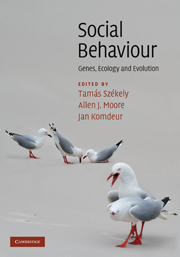Book contents
- Frontmatter
- Contents
- List of contributors
- Introduction: The uphill climb of sociobiology: towards a new synthesis
- Profile: Undiminished passion
- Part I Foundations
- Part II Themes
- Part III Implications
- 16 Personality and individual social specialisation
- Profile: Behavioural ecology, why do I love thee? Let me count the reasons
- 17 Molecular and genetic influences on the neural substrate of social cognition in humans
- Profile: Anonymous (and other) social experience and the evolution of cooperation by reciprocity
- 18 Population density, social behaviour and sex allocation
- Profile: Social theory based on natural selection
- 19 Social behaviour and speciation
- Profile: Look to the ants
- 20 Social behaviour in conservation
- Profile: The handicap principle and social behaviour
- 21 Prospects for research in social behaviour: systems biology meets behaviour
- Species index
- Subject index
- References
Profile: The handicap principle and social behaviour
Published online by Cambridge University Press: 05 June 2012
- Frontmatter
- Contents
- List of contributors
- Introduction: The uphill climb of sociobiology: towards a new synthesis
- Profile: Undiminished passion
- Part I Foundations
- Part II Themes
- Part III Implications
- 16 Personality and individual social specialisation
- Profile: Behavioural ecology, why do I love thee? Let me count the reasons
- 17 Molecular and genetic influences on the neural substrate of social cognition in humans
- Profile: Anonymous (and other) social experience and the evolution of cooperation by reciprocity
- 18 Population density, social behaviour and sex allocation
- Profile: Social theory based on natural selection
- 19 Social behaviour and speciation
- Profile: Look to the ants
- 20 Social behaviour in conservation
- Profile: The handicap principle and social behaviour
- 21 Prospects for research in social behaviour: systems biology meets behaviour
- Species index
- Subject index
- References
Summary
I have been watching birds since I was a child. H. Mendelssohn introduced me to the scientific aspect of ornithology. The book by Niko Tinbergen, The Study of Instinct (1951), convinced me that watching birds could be an intellectual challenge. I spent most of 1955 in Oxford with Tinbergen, a year that introduced me to ethology and to the study of behaviour at the gull colony in Ravenglass. In 1970, after working as an activist for conservation in the intervening years, I spent a few months at Oxford with David Lack, who convinced me that individual selection is the only mechanism by which to interpret adaptations.
My doctoral thesis was on the social behaviour of the white wagtail Motacilla alba. I was able to show by experiments how ecological conditions, especially food distribution, shape its social system. This study started my interest in studying the relationship between ecology and social systems (Ward & Zahavi 1973).
In 1972, my student and friend, Yoav Sagi, questioned the logic of Fisher's model of mate choice. This stimulated me to develop the handicap principle as an alternative to Fisher's model. The implications of the handicap principle dramatically changed my understanding of evolution. I soon realised that the handicap principle is a necessary component in the evolution of all signals (a signal is defined as a trait that has evolved in the signaller, in order to transfer information to receivers, to affect the behaviour of the receivers in a manner that is beneficial to the signaller).
- Type
- Chapter
- Information
- Social BehaviourGenes, Ecology and Evolution, pp. 535 - 537Publisher: Cambridge University PressPrint publication year: 2010
References
- 1
- Cited by



